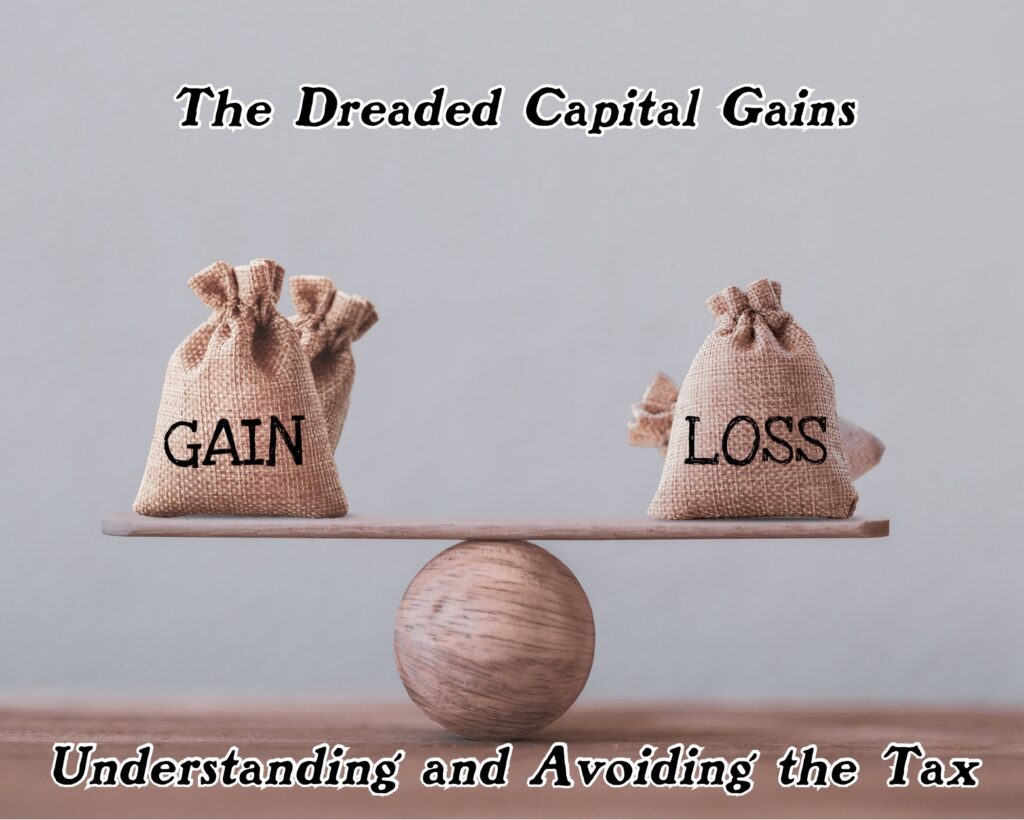Capital gains tax can significantly impact your financial portfolio, especially if you’re an active investor in assets like stocks, real estate, or other valuable items. Understanding what capital gains are and how to legally avoid or minimize these taxes is crucial for effective financial planning.
What Are Capital Gains?
Capital gains are the profits earned from the sale of an asset that has increased in value since it was purchased. These gains are categorized into two types:
Short-Term Capital Gains
- Definition: Profits from assets held for one year or less.
- Tax Rate: Taxed as ordinary income at your regular income tax rate.
Long-Term Capital Gains
- Definition: Profits from assets held for more than one year.
- Tax Rate: Typically lower than short-term rates, ranging from 0% to 20%, depending on your income level.

Strategies to Avoid or Minimize Capital Gains Taxes
1. Invest in Tax-Advantaged Accounts
- Retirement Accounts: Contributions to IRAs, 401(k)s, and other retirement accounts can grow tax-free or tax-deferred, mitigating capital gains taxes.
- Education Accounts: 529 plans offer tax-free growth and withdrawals for qualified educational expenses.
2. Hold Investments Long-Term
- Holding assets for more than a year qualifies them for the lower long-term capital gains tax rates.
3. Offset Gains with Losses
- Tax-Loss Harvesting: Selling assets at a loss can offset the capital gains, reducing your overall tax liability.
- Carryover Losses: If your losses exceed your gains, you can carry over the loss to offset future gains.
4. Real Estate Exclusions
- Homeowners can exclude up to $250,000 ($500,000 for married couples) of capital gains on the sale of their primary residence, under certain conditions.
5. Gift Assets
- Gifting assets to family members in lower tax brackets can shift the capital gains tax burden. Be mindful of the gift tax rules.
6. Charitable Donations
- Donating appreciated assets to charity can avoid capital gains taxes and provide a tax deduction.
7. Reinvest in Opportunity Zones
- Investing in Opportunity Zones can defer and potentially reduce capital gains taxes on previous investments.
8. Consider a 1031 Exchange
- For real estate investors, a 1031 exchange allows the deferral of capital gains taxes by reinvesting the proceeds into a new property.
9. Monitor Your Income
- Staying within a lower tax bracket can reduce your long-term capital gains tax rate.
10. Consult with Professionals
- Tax laws are complex. Consulting with a tax advisor or financial planner is recommended for personalized strategies.
How Can I Determine If My Asset Qualifies for Long-Term Capital Gains?
Understanding the Holding Period
- Criteria: An asset must be held for more than one year to qualify for long-term capital gains.
- Tracking Purchase Date: The holding period starts from the day after the purchase date and includes the day you sell the asset.
What If I Inherit an Asset? How Are Capital Gains Calculated Then?
Special Rules for Inherited Assets
- Stepped-Up Basis: Inherited assets typically receive a stepped-up basis, meaning the cost basis is the market value of the asset at the time of the original owner’s death.
- Impact on Capital Gains: This often reduces the capital gains tax if you sell the inherited asset, as the gain is calculated based on the value at the time of inheritance, not the original purchase price.
Can I Use Capital Losses from Previous Years?
Carrying Over Capital Losses
- Annual Limit: You can deduct up to $3,000 of net capital losses against your regular income each year.
- Excess Losses: Losses exceeding $3,000 can be carried forward to future tax years indefinitely, offsetting future capital gains.
Are There Any Exemptions for Small Business Owners?
Small Business Stock Exemption
- Section 1202 Exclusion: If you own qualified small business stock (QSBS) for more than five years, you may exclude up to 100% of the capital gains from federal income tax, subject to certain limits and conditions.
How Does the Sale of a Primary Residence Affect Capital Gains?
Exclusion for Sale of Primary Residence
- Exclusion Amount: Up to $250,000 of capital gains ($500,000 for married couples filing jointly) can be excluded if you’ve lived in the home for at least two of the five years before the sale.
- Reporting Requirements: You must report the sale on your tax return, even if all your gains are excludable.
What Should I Know About Capital Gains Taxes on Mutual Funds?
Capital Gains in Mutual Funds
- Distributions: Mutual funds often distribute capital gains to shareholders, which are taxable.
- Personal Sales: Selling mutual fund shares can also trigger capital gains taxes, based on the difference between the sale price and your cost basis.
Is There a Way to Invest in Real Estate Without Incurring Capital Gains?
Real Estate Investment Trusts (REITs)
- Taxation of REITs: While REITs distribute most of their income (which can be taxed), selling shares of a REIT can result in capital gains.
- 1031 Exchange: For direct real estate investments, consider a 1031 exchange to defer capital gains taxes.
Navigating the complexities of capital gains taxes requires a solid understanding of the rules and an awareness of the various strategies available to minimize their impact. Whether you’re dealing with stocks, real estate, mutual funds, or small business assets, it’s important to consider the tax implications of your investment decisions. Consulting with financial and tax professionals can provide tailored advice to help you manage your capital gains effectively.
Capital gains taxes, while unavoidable in many cases, can be managed and minimized through strategic planning. Understanding the nature of these taxes and employing tactics such as holding investments long-term, utilizing tax-advantaged accounts, and balancing gains with losses are key to reducing your tax burden. Always consider consulting with financial experts to tailor these strategies to your specific financial situation.
As an Amazon Associate we earn from qualifying purchases through some links in our articles.




